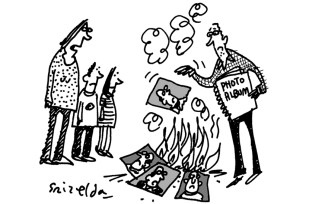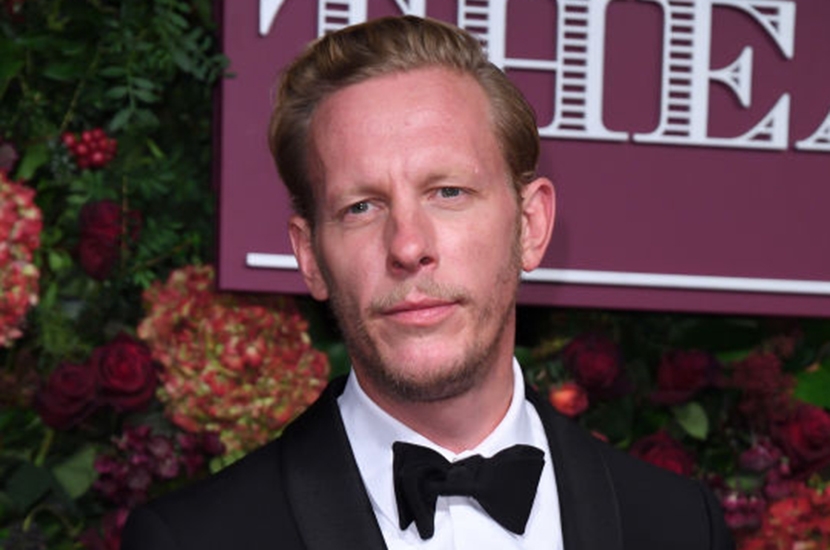First they came for the statues, then Basil Fawlty got ‘cancelled’ and three spoiled millionaires turned on their creator. So it was with J.K. Rowling’s woke progeny. Harry Potter, it would seem, is deathly shallow. Rupert Grint looked for a moment like holding firm, but he too quickly succumbed to the growing pressure to slip his golden dagger between Rowling’s shoulder blades. Surely these rich list regulars are perfectly placed to say what they actually think, protected from the ever-tightening vice of censorship? Apparently not. Fearing for their virtue or their future or both, the three children rounded on their mother. We must hope for better from Neville Longbottom.
I, too, have come to the conclusion that I may never get an acting job again without expressing ‘correct’ opinions. While this probably isn’t the end of the world for you, it is a cause of some sadness and anxiety for me. Not least because I’ve always loved my job and also because I have two children who need dinner and clothes and a holiday once in a while. In my job there is a lot of waiting around and a lot of banter and more serious conversations that take place on set. Until very recently, my views on life were met mostly with good humour and, if not always agreed with, always respectfully tolerated.
The genesis of this rather bleak view of my prospects came after my appearance on Question Time, where I voiced (slightly exasperatedly) a heresy that I’m fairly confident is held by a sizeable proportion of the population. The heresy was that, far from being hounded out by the baying racists of this statistically very tolerant and diverse country, Meghan Markle might, just might, have left for other reasons. Having spent years around actors, a fairly common trait is an enormous ego and the desire to be the centre of attention. I include myself very firmly in this bracket. So with little mental gymnastics involved, I wondered whether her departure might have had something to do with her being denied the limelight she craved.
I’d said this before on Gogglebox and no one had batted an eyelid. But that was six months earlier, which — amid such blossoming clusters of the pathogenic spread of the woke religion — is an eternity. My opinion was further bolstered as I watched the brave and admired prince slowly compost and droop before our eyes into a bit of a sop; less Prince Hal, more Prince ‘Hang on, what do I say next, darling?’
In this progressive monoculture, with its zealous quest for faraway utopias, I had committed a grave sin. I had used my white privilege to ‘berate and bully’ a person of colour, as the ethnic minority sub-committee of the actors’ union Equity put it.
‘Denounce him! Disgraceful!’ came the cries from the illiberal liberals, who see race in every injustice and cry ‘fascism’ at anyone who doesn’t view the world from their same narrow and unstable ledge of conformity. The media had a field day.

Fortunately I’d had the sense, before my brain became so scrambled I couldn’t think, to hire myself a very good lawyer (something others without my dwindling financial privilege can ill afford) and Equity was reminded politely but firmly that the clue to its job was in the title of the organisation. It agreed to apologise and remunerated me for my troubles. Subsequently the whole of the Equity’s newly formed race equality committee resigned, and as far as I can tell, the whole union seems to be on wobbly ground.
Time passed. I set about removing the tar and feathers and the left-wing commentariat patted itself on the back and moved on. Deliberately or not, though, they missed the real story. Which was more likely: that Britain is an overwhelmingly tolerant and welcoming country, one that people risk their lives attempting to reach, or that Britain is a place where racism and bigotry hide in plain sight? One of these stories sells papers and the other is true.
Anyway, all this is by the by. I use this story to point out that even in the smallest, most apparently meaningless situations, identity politics can cause ripples that turn into bigger and more powerful waves when whipped up by the winds of the outrage media. Our silence at their corruption is read by them as consent.
On 25 May the world watched as a policeman kneeled on a man’s neck for almost nine minutes, killing him. Our jaws dropped in horror and disgust. Something needed to be done. Justice needed to be done and seen to be done. On that, all were agreed. Black lives matter — three such powerful words. Words we all could unite behind. But was it that simple?
A week later, I got a text from a very well-known young actor with a screenshot of a tweet of mine which read: ‘Every single human life is precious. The end.’ ‘Can you explain this to me?’ said the message. My phone rang; I picked it up and knew straight away that my friend and I were not alone on the call. I heard a quiet shushing, an awkward pause, the white noise on the line changed to speakerphone levels, the louder background and less intimate voice that give these things away.
In this progressive monoculture, with its zealous quest for faraway utopias, I committed a grave sin
‘Hey Loz… I want to really understand you… I mean… I defend you and as you know… I really love you… [You’re an actor, the only thing you love is the mirror, darling] but this… this is really hard…’
‘Which part of it?’ I said.
‘Can’t you see it’s just wrong?’ they said.
‘What?’ I said.
‘Loz…’ came the gently menacing reply. ‘How can I defend you, man? When you are saying shit like this?’
‘Shit like what?’ I said. ‘That every single human life is precious? Which part of that is problematic for you?’
‘It’s racist,’ came the reply.
Cue deep sigh. Let me say at this point that I firmly believe that most people take the BLM mission statement at face value and support it in kind. I’m aware that I am not black and have no concept of the lived experience of anyone other than myself.
Now where was I? Yes. I asked my ‘chum’ what they saw when they looked at the media coverage of this whole story. I asked whether they had heard of David Dorn (a retired policeman gunned down by a looter attempting to rob a pawn shop) once the rioting began, in the news. I asked whether they thought it was in any way significant that David Dorn (also a black life) had been murdered in cold blood, yet George Floyd’s senseless killing dominated every headline. I asked whether they thought it was significant that the man who gunned down David Dorn when caught would be charged with first-degree murder, and yet George Floyd’s killer would be tried for second-degree murder at best. I asked: was this fair? I asked whether the media might perhaps be complicit in fanning the flames of outrage? Whether George Floyd’s equally precious life was being used to serve other, more sinister objectives?
There was a silence. We ended the call frostily and haven’t spoken since.
My conclusion is that this tragic situation has become part of another narrative, a series of stories wound together to serve a broader societal aim. Righteous global outrage at a cruel and vile killing has morphed into a different agenda. Similar things have happened with other movements; #MeToo, Extinction Rebellion, Brexit, even the Covid-19 pandemic. The left rightly expose great chasms of inequality and hypocrisy in society — then proceed to throw themselves like lemmings into that void, unable to obey their own edicts. Desperately important causes have been politicised to the point of meaninglessness, opportunities for action hijacked swiftly by the cynical actors. No human being could fail to be appalled by what happened to George Floyd. We were united in our outrage. But what could have been a moment for unity has instead torn us apart.
All injustice needs our collective and righteous anger. But the pursuit of that justice should bring us together, not divide us. Not social justice, not climate justice, not black justice. Just justice.
We must start with what unites us, beginning with trying to see the best in people. Though some will exploit our good faith, we should offer it nevertheless. We must be aware of biased media, including our own state broadcaster the BBC. It has moved from the Jeremy Bowen-style ‘show not tell’ reportage of old, to one that describes protests that led to hospitalisations and mass arrests as ‘largely peaceful’. Some news suppliers have decided to relativise, and even encourage, angry mob tactics.
So here I am, a white posh bloke, who loves his job, who has worked hard to be good at it, facing an uncertain future — all for the heinous sin of shaking my fist at the ugly, hypocritical and inconsistent god of progressivism. But unhappily for some (my agent and bank manager mainly) I will continue to say what I believe to be true. I’m not always right and very often wrong, but unless we can accommodate multiple understandings of a situation soon, it will all end with us abandoning words and reason, the tools given to us to heal and come together, in favour of the simpler but far more terrifying tools of engagement: fists, knives and guns. It’s already happening, and we should all be concerned by it. We cannot stand by in silence. Words are the answer.





Comments